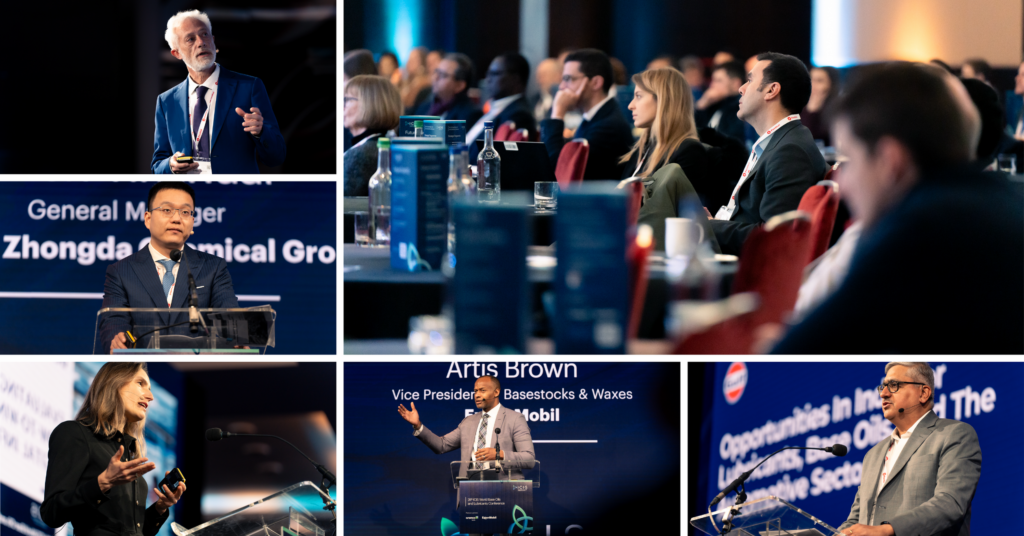The recent ICIS World Base Oils and Lubricants Conference in London provided a platform for industry leaders to share crucial insights and discussions. The Leadership Keynote Sessions featured distinguished figures such as Artis Brown from ExxonMobil, Aldo Govi from Infineum, and Ravi Chawla from Gulf Oil Lubricants India, focusing on critical topics. The event also highlighted the industry’s commitment to diversity with the empowering Women in Base Oils & Lubricants Get-Together.
Apu Gosalia’s session on the EU Corporate Sustainability Reporting Directive emphasized the importance of navigating sustainability standards. Here are the key takeaways from the event:
1. The Role of the Lubricants Industry
ExxonMobil‘s presentation spotlighted the industry actively shaping the future to be more sustainable and efficient. The focus was on crafting products tailored for the evolving landscape, optimizing performance for fuel economy, managing biofuel combustion byproducts, and striving for a lower lubricant carbon footprint.
2. Engine Oil Lubrication Impacts of Hydrogen ICE
AFTON‘s presentation addressed the impact of emissions legislation on commercial vehicle original equipment manufacturers (CV OEMs). It emphasized the pursuit of optimization in internal combustion engine (ICE) systems and the development of hydrogen internal combustion engine (H2 ICE) technologies. New hardware introduces specific lubrication needs, with Afton’s technology showing promising performance.
3. Analysis and Forecasts on China’s Base Oil Market
Wuchan Zhongda Chemical Group highlighted China’s surge in base oil exports since 2021, driven by improved quality. Despite reduced imports, Chinese domestic refiners, led by Sinopec and Hainan Handi, aim for a strong presence in foreign markets.
4. New Challenges for Transformer Oils in Electrical Grids
Nynas‘ presentation drew focus to the vital role of transformer oils in supporting climate goals amid the dynamic evolution of the global electrical grid landscape. Key challenges include reducing the carbon footprint, ensuring scalability for transformers, and addressing load swings and voltage fluctuations.
5. How the Quality of Collected Used Oil Can Be Improved
Slicker Recycling highlighted the importance of improving the quality of collected used oil to support the circular economy. Its AVISTA Green process categorizes base oil into Group I+, offering practical measures to enhance sustainability and resource-efficient manufacturing.
6. What You Need to Know About the Corporate Sustainability Reporting Directive (CSRD-ESRS)
Fokus Zukunft‘s presentation on the CSRD-ESRS outlined the European Commission’s recommendations for achieving climate neutrality by 2050. The directive impacts various companies, with compliance starting in the financial year 2024. The EFRAG plans sector-specific standards in 2026, signaling a pivotal shift in businesses aligning with the evolving sustainability reporting standards.
Additionally, Kline actively participated in the conference, providing valuable insights into re-refined basestocks and immersion cooling. Milind Phadke, Kline’s Energy Vice President, delved into a noteworthy development—the introduction of a new Extended Producer Responsibility (EPR) regulation targeting used oils in India. Yana Wilkinson, Kline’s Energy Vice President, highlighted the exponential growth of immersion cooling for digital infrastructure. The increasing demand for data server farms necessitates efficient cooling solutions, with high-performance basestocks playing a crucial role in meeting evolving needs. For more information about Yana Wilkinson’s presentation, please feel free to contact us.
Want energy industry updates, expert analysis, insider tips, and webinar invites in your inbox? Click here to sign up for the Kline newsletter.

